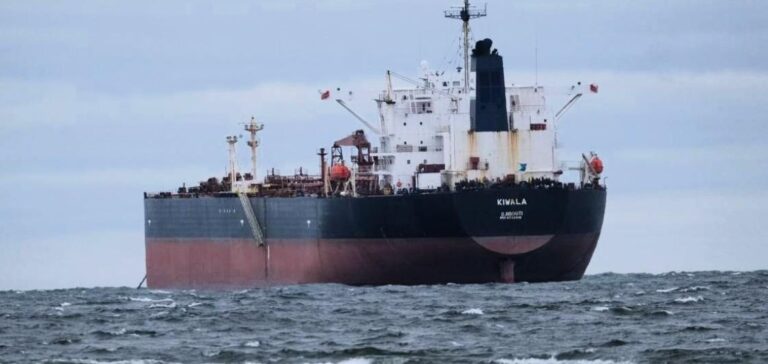Estonia’s naval forces detained a tanker suspected of being part of Russia’s so-called “shadow fleet” in the Gulf of Finland, Estonian Navy Commander Ivo Vark confirmed on 11 April. The operation was conducted to verify the vessel’s legal documentation and registration status. The ship, named Kiwala, was heading to the Russian port of Ust-Luga. Preliminary inspections determined that the vessel is currently stateless, despite presenting a certificate indicating registration under the flag of Djibouti, a claim now disputed by the East African state.
A vessel under multiple sanctions
The Kiwala is subject to economic sanctions imposed by Canada, the European Union, Switzerland and the United Kingdom, according to information provided by the Estonian Navy. The tanker is owned by Tirad Shipping Inc, a company registered in Mauritius with only this vessel in its fleet. The ship’s captain is a Chinese national, and the 24 crew members are primarily from China and Mauritania.
Shadow fleet and maritime security concerns
Experts state that the Russian Federation operates a parallel fleet of hundreds of vessels lacking official identification to circumvent international restrictions on its oil exports, imposed following the invasion of Ukraine. Veiko Kommusaar, head of Estonia’s border guard, said that numerous unregistered maritime vessels have been detected in the area over the past year. He assessed that the Kiwala is part of this undeclared logistical system.
Regional tensions and infrastructure threats
The appearance of anonymous vessels in the Gulf of Finland comes amid heightened regional tensions, including sabotage of undersea cables in the Baltic Sea. Although the investigation of the Kiwala is not directly related to these incidents, it has raised renewed concerns about the safety of submarine infrastructure. Such actions are often interpreted as elements of a “hybrid warfare” strategy allegedly employed by Russia against member states of the North Atlantic Treaty Organisation (NATO).





















